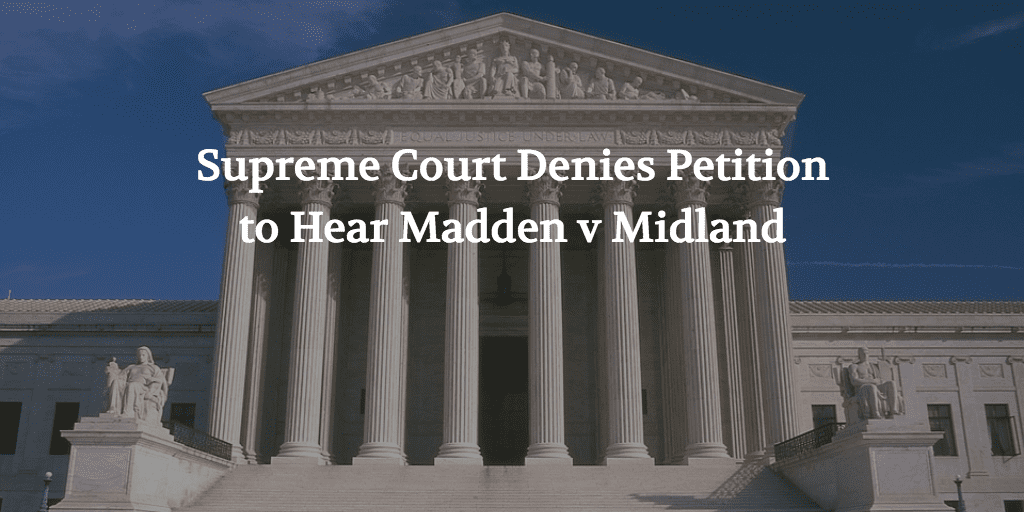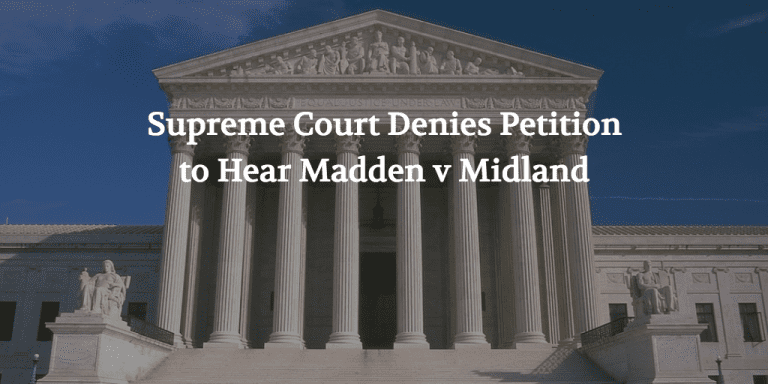
[Editor’s Note: We recently covered in depth what is going on with marketplace lending and regulation in a podcast with Brian Korn, but this morning we learned that the Supreme Court denied the petition to hear the Madden v Midland case. We got in touch with Brian Korn, Capital Markets Partner at Manatt, Phelps & Phillips, LLP to share with us exactly what this means for marketplace lenders.]
In somewhat of a surprise move, the U.S. Supreme Court denied the petition by Midland Funding to hear the case Madden v. Midland Funding. The decision leaves in place the decision of the U.S. Court of the Appeals for the Second Circuit that the National Bank Act (NBA) does not provide a shield against state law (namely, the charging of usurious interest under state law). A national bank cannot sell a loan to a non-bank with that non-bank exempt from state law. This is what is known as the “preemption argument.” Despite the strong objections of industry lobbying forces and the U.S. Solicitor General, the Supreme Court denied hearing the case. By not hearing the case, the precedent of the appeals court stands. But it does not stand for a wider approval or precedent in any other circuit other than the Second Circuit (NY, CT & VT). Here are the implications for marketplace lenders:
- Non-bank purchasers cannot buy loans from banks operating under the NBA in the Second Circuit that exceed applicable state usury caps. In New York, by far the largest state of the Second Circuit, the usury cap is 16% without a state lending license, and 25% with a license.
- Such loans may be deemed uncollectible.
- This is a major problem for securitization of Second Circuit loans, as many securitization trusts purchase loan assets from national banks.
- Marketplace lenders generally do not purchase loans from banks operating under the NBA, so Madden technically does not apply to them. Both Madden and Midland made this argument in their briefs to the Court. However, the factual analogy is compelling enough to spook investors and therefore platforms away from originating loans in the Second Circuit.
- Credit for the over 16% borrower in the Second Circuit will continue to be tight from originators that rely on loan sales or securitization. This includes subprime consumer and auto loans.
- Small business and real estate platforms should not be impacted by the decision.
- The case is now remanded to the District Court to decide the two remaining claims:
- That both parties elected Delaware choice of law, which recognizes the “valid when made” doctrine and therefore does not rely on the preemption ruling. Valid when made means if the loan was valid when made, it doesn’t not matter in whose hands it is sold or assigned, the borrower is still bound by the contract.
- Even if New York law governs (i.e., the District Court rejects, as is somewhat common, a consumer’s election of law in a fine print credit card agreement), the “valid when made” doctrine is still the law of New York.
- The big unanswered question is how the court will apply two competing state laws: valid when made vs. usury. The judges involved will play a critical role here.
- If choice of law is honored or if the home state law honors valid when made, the preemption case will become somewhat of a troubling academic exercise.
- Platforms have already started reshaping their legal relationships with banks to be factually distinct from the facts in Madden. This may mean keeping more loans on bank balance sheets, appointing the bank the master servicer, adding “skin in the game” by banks investing in loans or deferring compensation to banks until the borrower performs on the loan for some or all of the term.
- Platforms have also pursued the alternative or complementary strategy of becoming licensed in various states so as to not need to rely on a bank funding partner.
- Future challenges to the Madden case are likely to come out of the Second Circuit given the strong negative view of the Solicitor General and the importance of the case to the industry.
- We are keeping an eye on the Bethune v. LendingClub, WebBank et. al case and its implications on the “true lender” doctrine. Unlike Madden which deals with the power of a bank to sell its assets, the true lender cases have the view that there never really was a bank involved. This case will also be a test of the platforms’ mandatory arbitration clauses contained in every consumer loan agreement.
In some respects this is a positive for platforms which might have faced the prospect of a Supreme Court siding with Madden and effectively “nationalizing” the case. By denying cert, the Court has localized the damage caused. Platforms will begin to mitigate the effects of Madden, but in the short term, credit availability in the affected areas to the affected borrowers will be relatively scarce.


